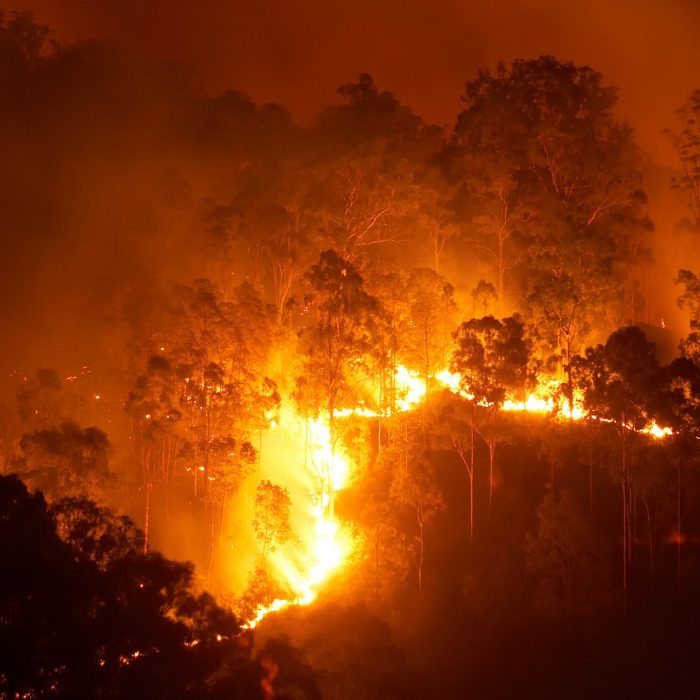Extreme Bushfire Analysis

Enrol
Fundamentals - 3 days
Advanced - 5 days
In-Person
Canberra City Campus
Fundamentals - $3300.00
Advanced - $4750.00



Overview
As global warming causes plants, trees and grass to become drier and more flammable for longer periods, the world has seen a dramatic increase in extreme bushfire events – far beyond anything in recorded history. This global bushfire crisis has resulted in catastrophic loss of life, property, species and ecosystems, and has caused huge economic impact to the areas affected.
In this bushfire analysis course run by UNSW Bushfire and instructed by experts at the forefront of global bushfire research, you’ll explore the fundamentals of bushfire behaviour and the latest concepts and approaches in bushfire behaviour science. With UNSW Bushfire’s pioneering research at your disposal, you’ll gain an up-to-the-minute understanding of dynamic fire behaviour and extreme bushfire development and increase your understanding and uptake of recent bushfire science.
Our extreme bushfire analysis short course program offers two course lengths to suit your preferred level of learning – a three-day fundamentals course, plus a more in-depth five-day advanced course. The three-day course provides a solid foundation of the fundamentals of extreme bushfire analysis, while the five-day course expands on these core concepts and covers additional topics such as predictive tools and modelling approaches.
Course content
In the three-day fundamentals extreme bushfire course, you’ll cover topics including:
- Types of fires and their development.
- Key drivers of fire behaviour.
- Meteorological processes involved in pyrocumulonimbus (pyroCb) development.
- Critical fire weather and climatic factors influencing extreme bushfire.
- The impact of climate change on bushfire occurrence.
- The implications of extreme events on government, fire agency and industry decision makers.
- Dynamic fire propagation.
- Simulation and modelling of extreme fire events.
Across the five-day advanced extreme bushfire course, you’ll cover all the above topics, plus:
- The development of predictive tools for extreme fire events.
Learning outcomes
On completion of the three-day fundamentals course, you’ll be able to:
- Identify and describe dynamic fire behaviours, including merging, eruptive spread, vorticity-driven lateral spread, and ember storms.
- Recognise the differences between dynamic fire propagation and traditional fire prediction techniques.
- Explain the mechanisms of extreme fire development, including deep flaming and pyroCb development.
- Comprehend how climate change is influencing the frequency and intensity of extreme bushfires.
- Develop and awareness of the use of fire simulators in both operational practice and scientific research.
On completion of the five-day advanced course, you’ll have learned the above, plus you’ll be able to:
- Evaluate the development and application of models for extreme fires occurrences.
- Develop a deeper understanding of the use of simulators in scientific research and operational practice.
- Assess operational and policy considerations for the prediction and management of extreme fire events.
Who should attend
This extreme bushfire short course is ideal for:
- Government personnel working in fields like environment, climate change, planning, recovery and resilience, in roles including policy, research and planning officers, ministerial advisors and executive-level leaders.
- Firefighting professionals, including fire behaviour analysts, risk officers, program leads, change managers, project managers and fire operations employees.
- Emergency services personnel, such as emergency services managers, fire capability managers and cultural fire program officials.
- Professionals in private industry, including risk analysts, research officers and consultants.
Prerequisites:
There are no prerequisites for this course.
Facilitators
Jason Sharples
Jason is a mathematical scientist at the University of New South Wales (UNSW), Professor of Bushfire Dynamics and Director of UNSW Bushfire. As an internationally recognised expert in dynamic bushfire behaviour and extreme bushfire development, his research has extensively influenced policy and practice in Australia and internationally. He uses complex mathematical and computational models to understand the dynamics of wildfire propagation and to pinpoint geographic features and weather conditions more likely to generate extreme bushfires. He is involved in national and international research projects and contributes to international professional dialogue.
Dr Duncan Sutherland
Dr. Duncan Sutherland is a dedicated researcher and educator specialising in computational fluid dynamics and bushfire science. Since joining UNSW in 2018, they have secured multiple competitive grants and partner projects focused on addressing catastrophic bushfire impacts. Dr. Sutherland’s research not only advances the field but also informs their teaching, where they are known for their empathetic, engaging approach that makes complex mathematical concepts accessible to students.
Rick McRae
Rick McRae is a visiting fellow at UNSW. He specialises in fire behavior and has served in technical specialist roles on major fires in the ACT, Tasmania, and Canada.
Rick recently retired from a career in bushfires and emergency management spanning over three decades. He worked as a fire management planner and as an arson investigator and on a wide range of natural hazard risk assessments, including wildfire, flood, severe storms, landslides, raised dust, and heatwaves. He has served on or chaired a number of national emergency management working groups, spanning spatial data, bushfire seasonal outlooks, emergency response, and training.
After the 2003 Canberra fires, he studied fire thunderstorms (pyroCbs) and joined an international science collaboration studying them. He has worked on key pyroCb case studies, including identifying vorticity-driven lateral spread and confirmed pyro-tornadogenesis alongside the Bushfire Research Group at UNSW Canberra.
Cancellation policy
Courses will be held subject to sufficient registrations. UNSW Canberra reserves the right to cancel a course up to five working days prior to commencement of the course. If a course is cancelled, you will have the opportunity to transfer your registration or be issued a full refund. If registrant cancels within 10 days of course commencement, a 50% registration fee will apply. UNSW Canberra is a registered ACT provider under ESOS Act 2000-CRICOS provider Code 00098G.